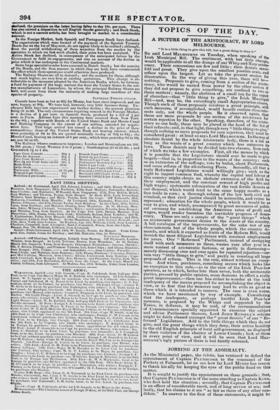TOPICS OF THE DAY.
A PICTURE OF THE ARISTOCRACY, BY LORD MELBOURNE.
" It is a little thing to give this bill, but a great thing to deny it," So said Lord MELBOURNE on Tuesday, when speaking of the Irish Municipal Bill. The sentiment, with but little change, would be applicable to all the doings of our Whig-and-Tory aristo- cracy. Their concessions are few and little ; their denials mani- fold and great. They give upon the smallest possible scale, and refuse upon the largest. Let us take the present session for illustration. In the way of giving this year, there will be— nothing. Proposals to give, coming from a section of the aristo- cracy, who would be ousted from power by the other section if they did not propose to give something, are confined to two or three matters ; namely, the abolition of a small tax for the repair of churches—that " little thing to give," the Irish Municipal Bill—and, may be, the exceedingly small Appropriation-clause. Though each of these proposals involves a great principle, still each measure, if accomplished, would benefit certain class-inte- rests only, not the whole people. Be it observed again, that these are mere proposals by one section of the aristocracy for certain rejection by the other. Speaking, therefore, of the aristo- cracy as one body, these may be placed at the head of the list of their refusals; and, in that light, though very "little things to give," though nothing as mere proposals for sure rejection, they must be considered great : at least so says Lord MELBOURNE. In the way of absolute denial by the whole aristocratic body, there is a list as long as the wants of a great country which has outgrown its laws. These denials may be divided into two classes, from each of which we take a few examples. First, all the means by which it is possible that the Legislature should ever bet made to give largely—that is, in proportion to the wants of the country; such as an extension of the suffrage, vote by ballot, short Parliaments, and some reform of the all-refusing Peers. Secondly, all that a truly Reformed Legislature would willingly give ; such as the right to import common food, whereby the capital and labour Of this country might obtain an ideflnite extension of the field for their employment, and the constant reward of high profits and high wages ; systematic colonization of the vast fertile deserts at our disposal, which would tend to the same happy results as a free trade in corn ; a thorough reform of the law both civil and criminal, so that civil justice should be accessible, and crime be repressed ; education for the whole people, which it would be so easy to give, and which, accompanied by great measures of politi- cal economy for establishing the American rates of profit and wages, would render harmless the inevitable progress of demo- cracy. These are only a sample of the "great things" which an aristocratic government denies to the wants of the country. A full catalogue of the improvements, for the sake not of any class-interests but of the whole people, which the country de- mands, and which it expected as fruits of the Reform Bill, would furnish the most diligent Legislature with constant employment for years. Our " Reformed" Parliament, instead of occupying itself with such measures as these, wastes year after year in a mere contest of aristocratic factions, or partly in discussing— merely discussing over and over again for repeated rejection—cer- tain very "little things to give," and partly in resisting all large proposals of reform. This is the rule, almost without an excep- tion. And when, perchance, something occurs which looks like an exception to this rule,—as in the case of the Irish Poor-law question, as to which, better late than never, both the aristocratic parties, pressed by public opinion, seem desirous to effect a really great improvement,—then one has either to wonder at the total inadequacy of the means proposed for accomplishing the object in view, or to fear that the measure may lead to evils as great as those which it is intended to remove. The case is even worse, which we have mentioned by way of example. Considering that the inadequate, or perhaps hurtful Irish Poor-law measure, is proposed by the Whigs and supported by the in defiance, it may be said, of the recommendations of Commissioners specially appointed to examine the subject and advise Parliament thereon, Lord Jonst RUSSELL'S scheme might be fairly classed amongst the" great denials" of our" Re- formed" Legislature. Add to the little things which they do. not give, and the great things which they deny, their active hostility to the old English principle of local self-government, as displayed by their violation of the charter of Lower Canada ; look at them in every point of' view, and it will be seen that Lord Ma.- BOURNE'S ugly picture of them is but faintly coloured.


























 Previous page
Previous page